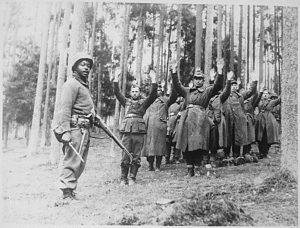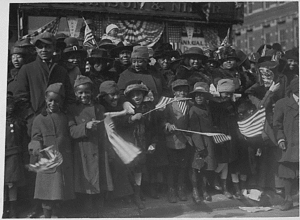As the United States approaches a Memorial Day holiday a deeply—and it seems, hopelessly—divided nation, I find myself contemplating the life and tragic death of an American soldier. He did not die in Afghanistan or in Syria. His life was not taken at the hands of ISIS, al-Qaeda, or some other foreign adversary. Instead, he died right here in America. This brave soul died at the hands of a fellow American. His story is one most American historians are familiar with but most Americans choose to forget. Richard Collins III, who had just been commissioned as a U.S. Army lieutenant, died at the hands of a white supremacist. His tragic fate is a reminder of the honorable, and yet also tortured, legacy of the African American soldier in American history.
African American sacrifice in warfare is not far from the heart of American intellectual history. Consider, for instance, that Harold Cruse served in the Army during World War II, where some of his thoughts about African Americans, the Left, and American society were beginning to form into a coherent line of reasoning. The height of James Baldwin’s career and mainstream fame should not be divorced from the  concurrent heightening of the Vietnam War. Intellectuals such as Baldwin, Angela Davis, William Strickland—not to mention Christopher Lasch or Norman Mailer, among many others—all wrote against the backdrop of a war in which thousands of Americans and many thousands more Vietnamese were dying by the year. That Vietnam, like other wars in the twentieth century, sparked debates among African Americans about whether sacrifices were being made in vain, is not a surprise at all. In modern times, Ta-Nehisi Coates has expressed reservations about the use of drones to kill suspected terrorists in the Middle East.
concurrent heightening of the Vietnam War. Intellectuals such as Baldwin, Angela Davis, William Strickland—not to mention Christopher Lasch or Norman Mailer, among many others—all wrote against the backdrop of a war in which thousands of Americans and many thousands more Vietnamese were dying by the year. That Vietnam, like other wars in the twentieth century, sparked debates among African Americans about whether sacrifices were being made in vain, is not a surprise at all. In modern times, Ta-Nehisi Coates has expressed reservations about the use of drones to kill suspected terrorists in the Middle East.
There is, however, another element to black soldiering that I wish to also bring attention to as we prepare to contemplate the loss of American life in previous (and current) wars. The links between black soldiers, citizenship, and white backlash are—literally—as old as the American republic itself
. To fight for one’s country, so the thinking went, meant that surely the nation would give African Americans equal rights. Time and again, African American veterans and their families were disappointed by the nation’s refusal to properly honor their sacrifice—and after the Civil War and Reconstruction, their constitutional rights.
The most blatant manifestation of this brutal, hypocritical treatment of African American veterans was the murder of returning black veterans in the United States after World War I and World War II. Both post-war periods contained Red Scares that cannot be divorced from what could be called “Black Scares” concerning African American demands for civil rights. After all, in the South—and indeed, across much of the nation  —anyone found supporting demands for equal rights could easily be tarred with the epithet of Communist. What happened to some veterans, however, was unconscionable. Murdered simply for daring to wear a uniform of the United States military while also being black. Never mind the betrayal of African American veterans left out of the G.I. Bill.
—anyone found supporting demands for equal rights could easily be tarred with the epithet of Communist. What happened to some veterans, however, was unconscionable. Murdered simply for daring to wear a uniform of the United States military while also being black. Never mind the betrayal of African American veterans left out of the G.I. Bill.
Such stories played an especially vital role in the post-World War II phase of the Civil Rights Movement. People across the nation were shocked and horrified when learning about black veterans being beaten, and in many cases murdered, by white mobs. Isaac Woodard’s blinding in 1946—which occurred in South Carolina—galvanized the nation and became a significant cause among liberals. Woodard’s blinding was commented on by Orson Welles and led to a Woody Guthrie song.
Richard Collins III’s story should not be divorced from these horrific incidents. The irony of thinking about his death so close to Memorial Day is that the holiday itself was born of African Americans, at the end of the Civil War, memorializing the Union dead who fell for both union and emancipation. I hope you take a moment tomorrow to think about the dead from American wars—and spare a special thought for the African Americans who have fallen for a country and a cause that retains both a place of hope and despair in the African American mind.

3 Thoughts on this Post
S-USIH Comment Policy
We ask that those who participate in the discussions generated in the Comments section do so with the same decorum as they would in any other academic setting or context. Since the USIH bloggers write under our real names, we would prefer that our commenters also identify themselves by their real name. As our primary goal is to stimulate and engage in fruitful and productive discussion, ad hominem attacks (personal or professional), unnecessary insults, and/or mean-spiritedness have no place in the USIH Blog’s Comments section. Therefore, we reserve the right to remove any comments that contain any of the above and/or are not intended to further the discussion of the topic of the post. We welcome suggestions for corrections to any of our posts. As the official blog of the Society of US Intellectual History, we hope to foster a diverse community of scholars and readers who engage with one another in discussions of US intellectual history, broadly understood.
I’ve always felt that this novel, “Captain Blackman”, by John A. Williams, didn’t get the kind of attention it deserved. But it’s good to see that it’s still available. https://www.kirkusreviews.com/book-reviews/john-a-williams-11/captain-blackman/
Bravo. I read “Captain Blackman” as a kid and it opened up my eyes to the real history of black veterans. This book should be on the bookshelf alongside Ellison’s “Invisible Man”.
Thanks for posting this, Robert. Somehow I hadn’t heard of the Woodard case before reading your post (or had forgotten about it). – TL